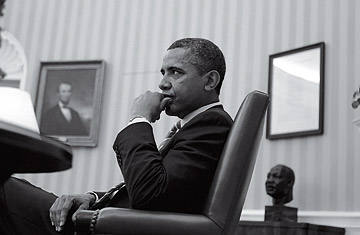
(4 of 7)
When asked to describe the Obama Doctrine, the President has chosen not to respond directly, but he explained that he believes the U.S. must act with other countries. "[Mine is] an American leadership that recognizes the rise of countries like China, India and Brazil. It's a U.S. leadership that recognizes our limits in terms of resources and capacity," he told TIME. That multilateral approach--listening to others, being aware of their national pride and interests and ego--is surely a product of his worldly background, with a Kenyan father, an Indonesian stepfather and a mother who was a serious student of global development. It has shown results. Obama told other countries to step up during the Libyan crisis if they expected American help. This was caricatured by some as "leading from behind," but really it forced others to act on an issue that the U.S. did not see as central to its national security. If France and Britain saw Libya as vital, he implied, they needed to put their money and militaries where their mouths were. In Asia, Obama let countries ask for American involvement rather than rushing forward to propose it. Countries are more willing to accept American leadership if Washington is patient enough to let them request it.
In an area that he does deem vital, Obama has shown himself willing to be extremely tough. Having tried to negotiate with the Iranians and been spurned by them, the Administration intensified the pressure on Tehran. It has ratcheted up sanctions, stepped up cooperation with the Israeli government and the Gulf Arab states and put in place even more crippling sanctions to pile up the costs on Iran. None of this would have been possible without significant multilateral diplomacy. The Chinese and Russians signed on to new sanctions at the U.N. (which ensures that they get enforced worldwide). Washington's European and East Asian allies have gone further in cutting off economic ties with Iran. Observing the results, Israel's Prime Minister, Benjamin Netanyahu, perhaps the world's leading hawk on Iran--and no fan of the President--admitted on Jan. 14 that the pressure was having an effect, that Iran was "wobbling" and that this kind of tough containment might actually work.
